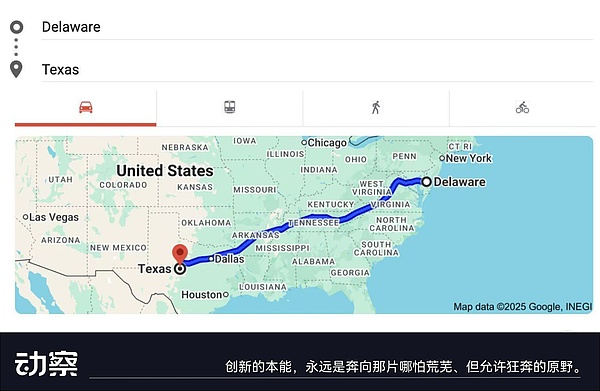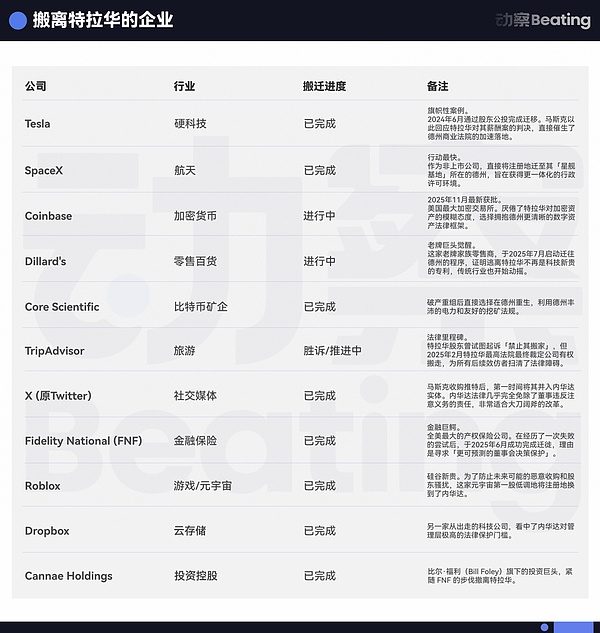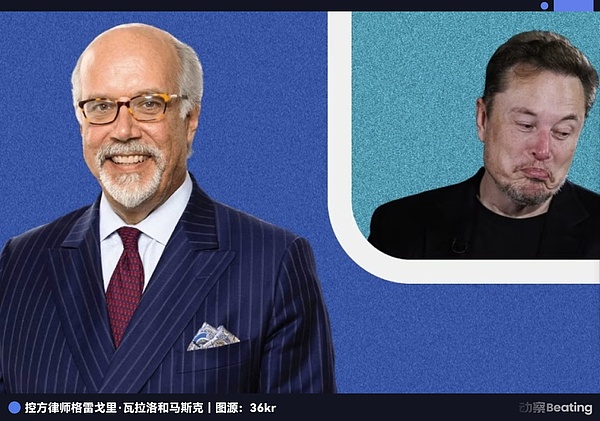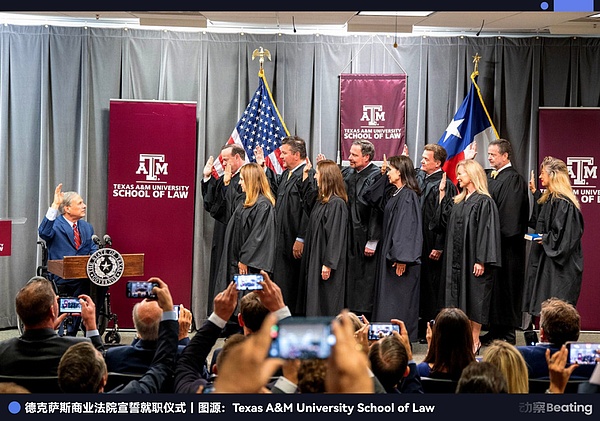
Author: Sleepy.txt

On the map, the United States is still a unified federation; but in terms of business logic, we are witnessing the United States being torn into “two countries.”
In the early winter of 2025, Coinbase, the largest cryptocurrency exchange in the United States, officially launched the process of moving its registration location from Delaware to Texas.
In the long narrative of American business history, it is difficult to ignore the decisive sense of pathos behind this resolution – this is not just a change of administrative address, it is more like a spiritual “patricide” and “apostasy.”
Over the past 100 years, Delaware has been the undisputed “Mecca” of American business civilization and the highest totem of the era of industrial rationality.
The so-called “Mecca” means that it is not only a geographical coordinate, but also the end of a belief.This narrow peninsula, covering just under two thousand square miles, is home to more than 66 percent of the nation’s Fortune 500 companies.
In the traditional narrative of Wall Street and Silicon Valley, a great company may be born in a garage in California, but its soul (legal entity) must be placed in Delaware.
It has the oldest and most professional Court of Chancery in the United States.For investors and professional managers of that era, Delaware represented an almost religious certainty—it was home to the most complete fiduciary duties, the most predictable library of precedents, and the security known as the bedrock of business.
But now, this rock that carries a century-old business faith has shown shocking cracks.
Coinbase’s exodus is not an isolated case. If you spread out the list of this round of migration, you will find that it is filled with the most restless and wildest names today.
Elon Musk is the driving force behind this escape.
The incident occurred a year ago.In that decision that shocked the world, a Delaware judge made the final decision, depriving Musk of the $56 billion pay package that took him ten years to acquire.Even if he miraculously achieved the performance goals that Wall Street initially considered a fantasy, pushing Tesla’s market value to a trillion-dollar peak, the judge still used a ruling to shred this results-based contract on the grounds that “the board of directors is not independent enough.”
The verdict outraged Silicon Valley’s nouveau riche.Then, the “Iron Man” took Tesla and SpaceX in a rage, and like the famous Mayflower, sailed decisively south to Texas.Now, unicorns like Coinbase and TripAdvisor are following suit, joining the breakout ranks.

This series of retreating figures announces the dusk of an old era.
In the past, large companies stayed in Delaware to seek protection because it represented the maturity and rationality of the rule of law; now, in order to survive and grow wildly, the top companies believe that they must flee Delaware to be safe.
For freedom, blood must be shed
In the cruel laws of the business world, freedom is never free.But for Musk and Coinbase, the price tag for this freedom is staggeringly expensive.
In the general public perception, the change of a company’s registered place seems to be just a simple administrative procedure – filling in a few forms and changing the address.But in fact, this is by no means a “moving” that can be done with tens of thousands of dollars in administrative fees. The giants have to pay a stifling bill.
First, they must hire a top law firm.At top law firms like Wachtell, Sullivan & Cromwell, partner rates have already topped $2,000 an hour.Just to draft a few hundred pages of proxy statements that comply with SEC regulatory requirements, the bill can easily exceed $5 million.
Second is the expensive war for votes.In order to convince BlackRock and Vanguard, these skeptical institutional shareholders, the company needs to hire a professional proxy solicitation company (Proxy Solicitor).For a large-cap stock like Tesla, this “canvassing fee” alone can reach millions of dollars, and it must be like running for the US president, requiring months of roadshows and lobbying.
The most fatal thing is the potential risk of default.Legal teams need to review tens of thousands of commercial contracts around the clock, because once the place of registration changes, the “change of control” clauses in many bond agreements may be triggered instantly.
In order to obtain relief from creditors, businesses often have to pay additional fees.This rate is typically between 0.25% and 0.5% of the total bond amount, based on market practice.For those giants with huge stocks of debt, this means tens of millions or even hundreds of millions of dollars in cash flow evaporating in an instant – this was originally valuable funds that could be used for research and development or repurchase, but now it has become a huge sunk cost.
Since the cost is so heavy, why would they rather leave with “broken arms”?
The answer lies in the shadows beneath Delaware’s glossy veneer of rule of law.
For today’s tech giants, Delaware is no longer a safe haven but a hunting ground filled with traps.Here, there is a huge, secretive and greedy group – The Plaintiffs’ Bar.
On Wall Street, people jokingly call this a “merger tax.”According to statistics, at its peak in the past decade, more than 90% of mergers and acquisitions valued at more than $100 million were subject to litigation in Delaware.This group of lawyers does not care about corporate governance. They are like sharks that smell blood. They only hold one share of the company’s stock on weekdays. Once the company makes a major announcement, they immediately file a class action lawsuit on the grounds of “insufficient disclosure.”
This has long evolved into a standardized “blackmail assembly line”: sue, block transactions, and force companies to settle.In order not to delay the transaction process, most companies have to pay this “buying money”, which usually amounts to millions or even hundreds of millions of dollars.
Dell, Activision Blizzard, Match Group… Looking through Delaware’s case collection, countless large companies have been “blackmailed.”Here, enterprises are no longer customers protected by law, but fat sheep being hunted legally.
This kind of blood-sucking reached the peak of absurdity in the Tesla compensation case.

When a Delaware judge ruled that Musk’s compensation plan was invalid, the plaintiff’s legal team applied to the court, requesting 29.4 million Tesla shares as a contingent fee.Based on the stock price at the time, the fee was worth as much as $5.6 billion.
US$5.6 billion is enough to directly buy Macy’s, the largest department store giant in the United States.
At this moment, the picture is clear.
This is no longer a manifestation of legal justice; it is a naked plunder of wealth creators.It was this heavy blow that made Musk completely give up, and also made Coinbase, who was watching on the sidelines, feel a chill down his spine.
Coinbase’s management is very clear that although the knife has not fallen on them yet, in this old world full of “professional plaintiffs” and “sky-high legal fees”, it is only a matter of time before they are harvested.
The giants have calculated their accounts and found that although the current legal fees, administrative fees, and public relations fees often cost tens of millions or even hundreds of millions, they are only a short-term pain.If we continue to stay in Delaware and lose control of the company in such a legal ecosystem and be forced to accept endless lawsuits and extortion, it will be an incurable “cancer.”
For freedom, blood must be shed.
The ruler of the old world cannot measure the ambition of the new world
If the sky-high “redemption fee” only makes Musks feel heartbroken, then the conflict at the bottom of Delaware’s legal logic is the fundamental reason why they feel suffocated.
This is not just a dispute over legal terms, it is the ultimate collision of two business civilizations.
Over the past 100 years, the reason why Delaware has been able to secure its iron throne of business is because it has concluded a tacit golden contract with the American business community – the Business Judgment Rule.
Its subtext is that as long as the board of directors is not corrupt or illegal, the judge will never interfere with how you do business.This is the ultimate respect for the entrepreneurial spirit and the cornerstone of American business prosperity.
But in recent years, this ruler has been deformed by the erosion of time.As the weight of institutional investors expands indefinitely, Delaware’s gavel increasingly begins to slide toward the other extreme—the Entire Fairness Standard.
This is a word that makes all Silicon Valley founders tingle when they hear it.Its subtext is: “I don’t care whether you create a business miracle, as long as the process does not meet my requirements, no matter how successful you are, it will be in vain.”
Musk’s $56 billion salary that was written off was a victim of this microscopic trial.
In that lawsuit, even though Tesla achieved the most insane performance growth in human business history, and even though shareholders made a lot of money, the Delaware judge still coldly ruled that Musk’s compensation was invalid.The reason is simply that the relationship between the board members and Musk is too good, and the process is not “perfectly independent”.
This kind of arrogance of “emphasis on procedures over results” may be a safety guardrail for traditional companies like Coca-Cola that are managed by professional managers; but for new species like Coinbase and Tesla that rely on the founders themselves to drive exponential growth, this is a fatal shackles.
The ruler of the old world can no longer measure the ambition of the new world.
Delaware judges can read steel, oil and railroad statements, but they have trouble understanding why Musk’s personal IP is worth $50 billion.
While Delaware was obsessed with ethics scrutiny, Texas was extremely pragmatic and threw out an ambitious “partnership agreement.”
This is not an empty “Welcome to Texas.”In September 2024, the Texas Business Court will officially open for business.This is not only a new agency, but a targeted attack by Texas on Delaware’s pain points.

It only handles large-dollar cases.According to the bill, the court exclusively has jurisdiction over commercial disputes where the amount in dispute exceeds US$5 million; for public companies, only cases involving more than US$10 million are eligible.This means that minority shareholder harassment lawsuits are directly blocked.
Even more disruptive is the process by which judges are appointed.Unlike Delaware’s justices, who serve 12-year terms and come from legal families, the Texas Commerce Court judges are directly appointed by Governor Greg Abbott and serve only 2-year terms.
This means that the judicial power and administrative power have reached an unprecedented tacit understanding on the goal of “promoting the economy.”If the judge rules against the business environment, he may lose his job in two years.The signal sent by Texas is very explicit: “Here, we don’t teach you how to be a man. We only protect the contract. As long as you can bring jobs and growth, we will protect you.”
The “founder model” represented by Coinbase and Musk is no longer willing to bow to the “manager model” represented by Delaware.They were fed up with being treated like wild beasts that had to be guarded against.So, they chose to pack their bags, leave the exquisite but suffocating greenhouse, and rush to the rough wilderness that allowed for savage growth.
american drift
This may not mean the end of Delaware.It will continue to be the home of Coca-Cola, Wal-Mart and General Electric for a long time to come.
For these “old aristocrats” who pursue stable dividends, value ESG scores, and are accustomed to governance by professional managers, Delaware’s sophisticated and cumbersome rules are still the best safety belt.
But for another group of people, the air there is too thin to breathe.
We are watching the United States tear into “two countries.”
One is represented by Delaware and New York.This place pays attention to distribution, checks and balances, and political correctness. It is like an exquisite museum, well-organized, but exuding an old-fashioned air.
One is represented by Texas and the New Frontier.This place emphasizes growth, efficiency, and even a kind of barbaric vitality, and is full of dangers and possibilities.
The departure of Coinbase and Musk is just the beginning.They are like canaries in the coal mine, using their most sensitive sense of smell to sense the vibrations deep in the ground before anyone else.
Of course, this migration is not without risks.
The fledgling commercial court in Texas has yet to be stress-tested by a major economic crisis, and the power grid there remains vulnerable during snowstorms.No one dares to guarantee that the next century-old business legend will be born here.
But this is the most fascinating and cruel thing about business – it never promises certainty, it only rewards those who dare to bet in uncertainty.
In this huge gamble about the future, capital cast the most honest vote with its feet.It tells us that when the order of the old world begins to ossify into constraints, the instinct of innovation is always to run towards that wilderness that is allowed to run wild even if it is barren.






